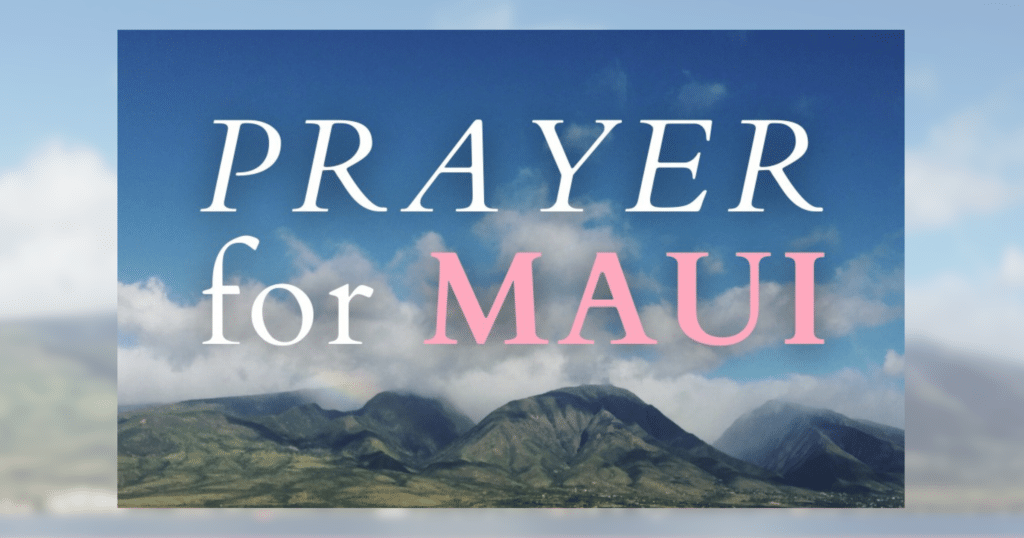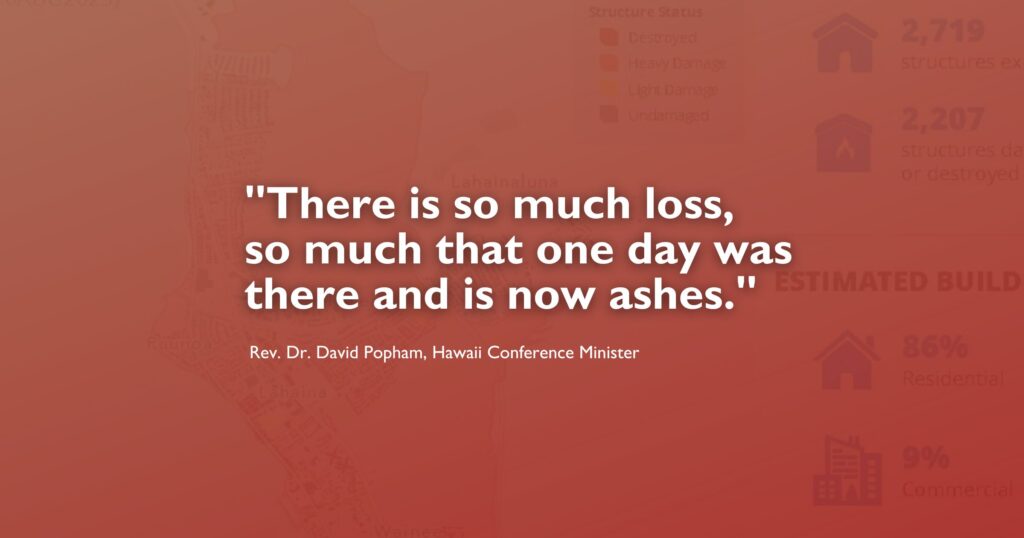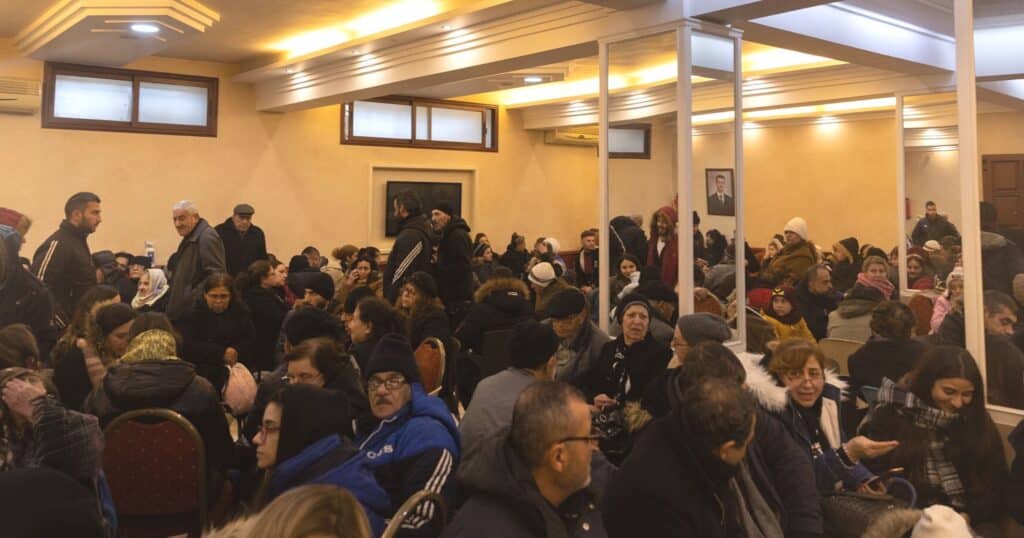Grant Aids UCC Churches on the Front Line of Wildfire

During the first week of the Butte Wildfire, First Congregational United Church of Christ of Murphys, Calif., organized a “Friendship Cabaret” to boost the spirits of members and neighbors evacuated from the fire zone. Photo courtesy First Congregational UCC.
Exhaustion, generosity, devastation, hospitality, service, insomnia – these are some of the words that the Rev. Bonnie Hollinger of First Congregational United Church of Christ in Murphys, Calif., uses to describe her congregation’s journey these past four weeks since the massive Butte Wildfire broke out.
Hers is one of two congregations on the frontlines of the fire that are sharing a UCC Disaster Ministries Recovery Grant as they help their members and communities through trauma and loss. The Murphys church and Union Congregational UCC in Angels Camp requested and received $3,000.
“Many people have been traumatized by this overwhelming, deadly fire,” wrote Union Congregational’s pastor, the Rev. Liz Armstrong, in the grant application. “We propose to serve those in Amador and Calavaras counties who need counseling and comfort in addition to material goods.”
The UCC Disaster Ministries grant supplements the two congregations’ own contributions plus $4,000 set aside by the Northern California Nevada Conference for wildfire response by the Murphys and Angels Camp congregations and the Community Church UCC Sebastopol, which is near the Valley Wildfire.
Furthermore, the conference and UCC Disaster Ministries are exploring ways to work together on long-term recovery and on how to support emotional and spiritual needs, said Disaster Ministries Executive Zach Wolgemuth.
The Butte Wildfire started September 9 and burned nearly 71,000 acres, killed two people, injured one and destroyed 475 residences. The Valley Wildfire started September 16 and burned more than 76,000 acres. Now 99 percent contained, it killed four people, injured four firefighters, and destroyed 1,958 structures including 1,280 homes and 27 multi-family structures.
Hollinger described how the Butte fire’s outbreak threw her and her congregation into a new reality of evacuation, shelters, bad air quality, lost wages, lost possessions, flattened homes, singed grass, tree roots that are still burning, power outages, the constant flow of fire trucks and the roar of bulldozers as they plowed up trees to create a barrier to the fire’s advance.
“The first week, I and many of my members were evacuated,” she said. “Those who weren’t evacuated welcomed those who were into their homes. I spent most of my time at the evacuation shelter as a pastoral resource, and members of my parish cooked meals for evacuees. Also during that first week, I tried to reach every one of our 175 members.
“I didn’t have anyone in my congregation lose their home,” she added, “but a lot of my people are traumatized. People say they are so exhausted. I am exhausted! I’ve preached about it – how we hold trauma in our bodies.”
ARMSTRONG: HELPING PEOPLE WORK THROUGH TO A HEALING PLACE
.jpg'] }})
Volunteers sift through the ashes of a home in Mountain Ranch, Calif., looking for valuables and cherished items. Photo by Liz Armstrong.
Union Congregational UCC’s Liz Armstrong echoed Hollinger’s stories of engagement and trauma. “I have been up in the fire zone,” she said, “helping people sift through ashes for valuables that may have survived the fire, and doing pastoral care. We are now in the first phase of recovery after four weeks of trauma, shock, dismay and confusion on the part of so many fire victims.
“Those in my church who were directly affected with loss of homes have been inundated with details of recovery, such as dealing with insurance companies, tending to injured animals and livestock, searching for lost cats and dogs, and helping others who have no insurance or place to stay. The exhaustion and trauma from the evacuation time have had little time to work themselves through to a healing place,” Armstrong said.
To help that process, she said, “In our church we have launched a month-long program beginning with my sermon entitled ‘Good Grief.’ We are working to see how God’s mercy remains with us steadily, how each of us grieves and heals in different ways, how imperative it is that we reach out into the community to serve and help, rather than simply “circling the wagons” around the trauma on our own faith community. We will look at self care, and at the hope and rebirth that can come through this process as we honor it like a pregnancy, and support bringing it ‘to term.'”
Hollinger said she also is reminding her members in their plight to “not forget the plight of the rest of the world. There are a lot of hungry people. We weren’t even like the refugees who don’t know where they are going. When we were evacuated, we had places to go and were received warmly.
“Those of us connected with the church are the lucky ones,” Hollinger added. “At the shelter, I heard so many sad stories of people estranged from family, or without family. In the church, we have each other. The church is not dying! We are alive and well and we cling to each other.”
EDITOR’S NOTE: To support long-term recovery of U.S. communities like these affected by disaster, you may contribute to the UCC’s Emergency USA Fund.
Related News
Hawai’i Conference offers space for grief, prayer for wildfires
Responding to the tragic wildfires in Hawaii, the Hawai'i Conference of the United Church of...
Read MoreAmid wildfires devastation, UCC makes appeal for Hawaii
The United Church of Christ, through Wider Church Ministries, is issuing a special appeal to...
Read MoreUCC offers prayers, launches appeal to aid Turkey and Syria after earthquake
The United Church of Christ is offering prayers for the region encompassing Turkey and Syria...
Read More

